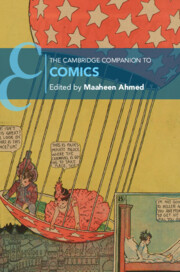Book contents
- The Cambridge Companion to Comics
- The Cambridge Companion to Comics
- Copyright page
- Contents
- Figures
- Contributors
- Acknowledgments
- Chronology
- Introduction
- Part I Forms
- Part II Readings
- Chapter 6 Comics and Multimodal Storytelling
- Chapter 7 Comics Adaptations
- Chapter 8 Comics Genres
- Chapter 9 Life Writing in Comics
- Chapter 10 Racialines
- Chapter 11 Women and Comics
- Chapter 12 Comics at the Limits of Narration
- Part III Uses
- Further Reading
- Index
- Cambridge Companions To …
- References
Chapter 7 - Comics Adaptations
Fidelity and Creativity
from Part II - Readings
Published online by Cambridge University Press: 17 August 2023
- The Cambridge Companion to Comics
- The Cambridge Companion to Comics
- Copyright page
- Contents
- Figures
- Contributors
- Acknowledgments
- Chronology
- Introduction
- Part I Forms
- Part II Readings
- Chapter 6 Comics and Multimodal Storytelling
- Chapter 7 Comics Adaptations
- Chapter 8 Comics Genres
- Chapter 9 Life Writing in Comics
- Chapter 10 Racialines
- Chapter 11 Women and Comics
- Chapter 12 Comics at the Limits of Narration
- Part III Uses
- Further Reading
- Index
- Cambridge Companions To …
- References
Summary
Literary adaptions in comics are not a recent phenomenon, but until recently the cultural status of this kind of work has always been very low, and a certain distrust has dominated the debates for many decades, the main reason of this suspicion being the fear that “fidelity” to the adapted model might jeopardize the proper creative possibilities of the adapting medium. More and more recent examples from the graphic novel field, which aims at becoming a literary practice itself, do not only show that literary adaptations can be very valuable, they also demonstrate that it is possible to use the notion of fidelity itself in highly creative ways. Taking its departure from specific case studies, Olivier Deprez’s adaptation of Kafka’s The Castle (2003), Paul Karasik (script) and David Mazzuchelli’s adaptation of Paul Auster’s City of Glass (2005), Simon Grennan’s adaptation of Anthony Trollope’s John Caldigate (2015), and Sébastien Conard’s adaptation of Samuel Beckett’s Watt (2019), this chapter examines the most important techniques that can be used to transfer a novel into a visual narrative in print. It pays particular attention to the visuality of the text as it is transferred from one medium to another (typography, page layout, text as drawing).
- Type
- Chapter
- Information
- The Cambridge Companion to Comics , pp. 143 - 165Publisher: Cambridge University PressPrint publication year: 2023

